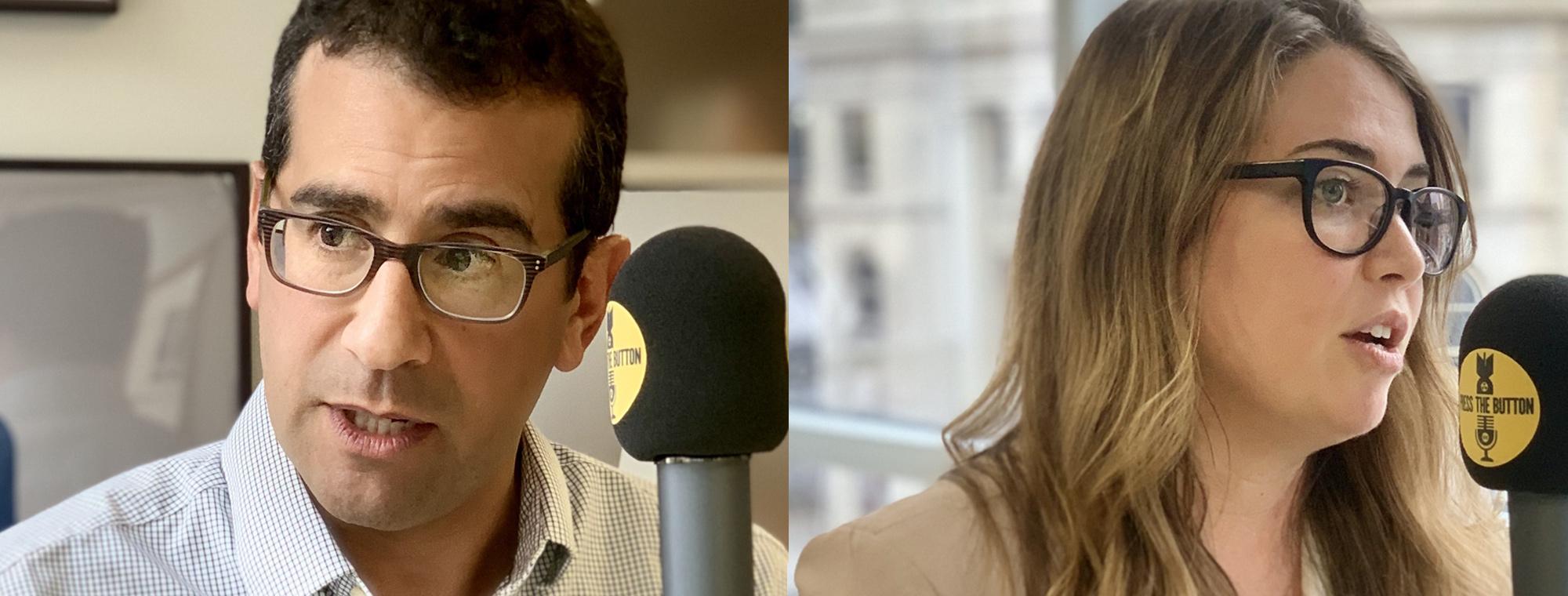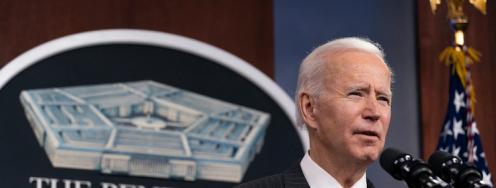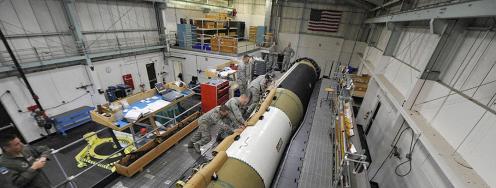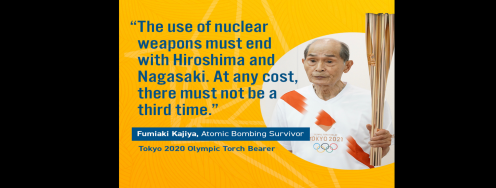This is a transcript of a recent Early Warning segment from the podcast Press the Button, in which Michelle Dover, Tom Collina, and Kate Kizer discuss escalating tensions between US and Iran, and how last week's events have made us less safe. Listen and subscribe to our weekly podcast today!
Early Warning segment, January 14, 2020
- Michelle Dover, Director of Programs, Ploughshares Fund
- Tom Collina, Director of Policy at Ploughshares Fund
- Kate Kizer, Policy Director at Win Without War
Michelle: Today on Early Warning, we are focusing on two questions. What do we know about the escalation we saw last week between the United States and Iran and what should we be doing about it now? Here to answer these questions are Kate Kizer, policy director at Win Without War, and Tom Collina, policy director here at Ploughshares Fund. Kate, Tom, do you think we can cover this in seven minutes?
Tom: No problem.
Kate: Let's try.
Michelle: Our time starts now. Tom, over the weekend we saw the Trump administration's story about when and why it decided to kill General Soleimani fall apart. What do we actually know about this strike and the following actions?
Tom: Thanks Michelle. I think there's two important questions to answer here. One is, was this attack legal? And the other is, was it smart? Does it make America safer? And I think we can answer no to both questions. On the first, it is now become clear that there is no evidence that there was an imminent threat that justified this attack. And we're now seeing reports that this attack was in fact planned months ago. It means you simply can't go and kill people just because you think they may be a danger to the United States at some point. This was not self-defense. This was in fact U.S. assassination of a foreign leader. Was this attack smart? Did it make us safer? And again, I think the answer is no. This attack could have easily led to a disastrous war with Iran. And that was only prevented because Iran was very measured in its response. And we got lucky they didn't have to be that restrained. You could also say that even their restrained attack could have led to American deaths in Iraq. That was not actually in their control as much as they tried, so I really do think that we dodged a bullet on this one. The U.S. attack has also undermined the U.S. position in Iraq. We now see Iraq calling for the removal of U.S. Troops. I actually think that will be a good idea to remove U.S. Troops, but that's not what President Trump intended. Certainly, the downing of the Ukrainian airliner falls into unintended consequences, a real tragedy. But when you go to the brink of war, bad things happen. Even though, this is creating a lot of domestic trouble for the Iranian regime, I think this attack has in general made Iranian hard-liners stronger. It supported their position against further engagement with the United States. And finally, it has pushed Iran to take steps away from the Iran nuclear deal and possibly restart elements of their nuclear program. So none of these things are what the U.S. wants. President Trump's actions assassinating General Soleimani have made us less safe.
Michelle: Thanks Tom. And I think it's also putting this in the broader context of these are just a series of actions in a longer ongoing relationship. Iran is likely to take more steps. The U.S. is likely to take more steps. We're clearly not out of the woods yet, Kate, when we talk about this potential for war, what does the American public think? Do they want a war?
Kate: The people in the United States have been really unequivocal in their opposition to a war with Iran, whether that's back in 2007 when the Bush administration tried to take us to war, or now, when Trump has really taken unprecedented action to take us to the brink of war. And so there's been recent polling showing again that the American public opposes a war. And not only that, that they believe, clear majorities believe, that Trump's actions to assassinate Soleimani have made the United States less safe and with good reason, it has made us less safe. There was no reason really strategically to do this except to provoke Iran into a conflict.
Michelle: So when we talk about the American public, you know what they think about a war, what were their actions? What did you see last week in terms of the demonstrations that Win Without War led along with its partners?
Kate: So it was a really exciting result. Last Thursday, there was a national day of action and across the United States there were over 375 different events, from places as far as Washington DC to California to Sedona, Arizona to Kansas where folks took direct action to demand no war with Iran that took the form of vigils to protest, to marches. Regular folks just standing on the sides of streets with signs declaring no war with Iran. And I think it was a really exciting translation of what the polling says into direct action to make policymakers in Congress actually take note that they need to be listening to the people who elected them and not to a war hungry administration.
Michelle: And I was just so struck, I don't know about you Tom, because I know you were at one of the demonstrations about the response from political leaders, the response from groups across the sector. I mean this was a huge effort by so many different organizations.
Kate: It was really exciting. You know, we came together Win Without War with MoveOn and the National Iranian American Council to organize these events and we had dozens of representatives come out and speak at the protest in DC. It also happened to be when the House of Representatives was voting on legislation to restrict the president's war powers to prevent more war. More legislation has already been introduced to defund an unauthorized war and get rid of the legal authorities that the administration is claiming that they can go to war under.
Michelle: When you talk about this new legislation that's been introduced, I mean that, that was my next question. So the demonstrations are over, as Tom was talking about, the cycle of escalation seems to be on a downturn for the moment. What should listeners be doing next?
Kate: So I think one thing is not to rest on our laurels. It's really clear that the administration is going to continue to escalate if not militarily, economically. They already announced a new blanket set of sanctions on a different economic sector in Iran. And so the American public has a really great opportunity. Next week when Congress is in recess, and many members of Congress will go home to their districts to attend town halls, organized district meetings, and ask their members of Congress to support legislation to defund an unauthorized war, support the War Powers Resolution that the house already passed as well as repeal the 2002 Iraq war authorization that the administration is trying to claim gives them the authority to kill people in Iraq who are Iranian.
Michelle: So let's say I'm a listener in Lansing, Michigan. Where do I go to find all of this information?
Kate: So you can go to winwithoutwar.org, niacouncil.org, moveon.org or nowarwithiran.org, to find more information and resources on how you can take action and still make an impact because regular folks' voices are so important at this moment in time. That's really what's going to take us back from the brink.
Michelle: Kate, Tom, our seven minutes are up. Thank you so much for joining.
Kate: Thanks for having me.
Tom: Thanks for having us.




